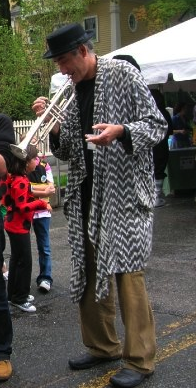
A lot of jazz would not have been recorded if left to the "majors" (Blue Note, Verve, Columbia, Atlantic). That's where "off" jazz labels like Argo and ABC Paramount stepped in and took care of business. I featured their music on the Duplex Mystery Jazz Hour on WZBC, 2.25.16
LISTEN HERE
PLAYLIST
"Excerpt From the Blues" from Happy Moods 1960 Ahmad Jamal (p), Israel Crosby (b), Vernell Fournier (dms).
Jackie/Roy "Walkin'" from Bits and Pieces 1957 ABC Paramount
"Five spot After Dark" from Meet the Jazztet-Art Farmer – trumpet Benny Golson – tenor saxophone, Curtis Fuller – tromboneMcCoy Tyner – piano Addison Farmer – bass, Lex Humphries – drums
Jimmy Raney "Last Night When We Were Young" from In 3 Attitudes 1957 on ABC Paramount
Lorenz Alexander "Trouble in Mind" from Sing no Sad Songs For Me 1961) ARGO
Don Elliott "I'm beginning to see the light" from "The Voices of Don Elliott" 1957)on ABC Paramount
Al Grey "Rompin" 45 rpm release 1961 on ARGO
Oscar Pettiford Orchestra "Speculation" from "Oscar Pettiford Orchestra in Hi-Fi" 1957 on ABC Paramount
"Time" from "Take a Number From 1 to 10. 1961, Benny Golson Octet/Nonet/Tentet Nick Travis (trumpet) Bill Elton (trombone) Willie Ruff (French horn) Hal McKusick (alto saxophone) Benny Golson (tenor saxophone) Sol Schlinger (baritone saxophone) Tommy Williams (bass) Albert Heath (drums)
Double Six oF Paris, "Stockholm Sweetnin'" 1961 on Phillips
Quincy Jones "Stockholm Sweetnin'" from This Is How I Feel About Jazz 1957 on ABC Paramount
The Call from Introducing Roland Kirk, 1961. Roland Kirk: tenor saxophone, manzello, whistle, stritch, Ira Sullivan: trumpet, tenor saxophone William Burton: organ, piano Donald Garrett: bass Sonny Brown: drums
Zoot Sims "Quicker Blues" from "Zoot Sims Plays 4 altos"1957 ABC Paramount
Vinnie Burke's String Jazz Quartet "A Night in Tunisia" from "Vinnie Burke's String Jazz Quartet" 1957 on ABC Paramount








